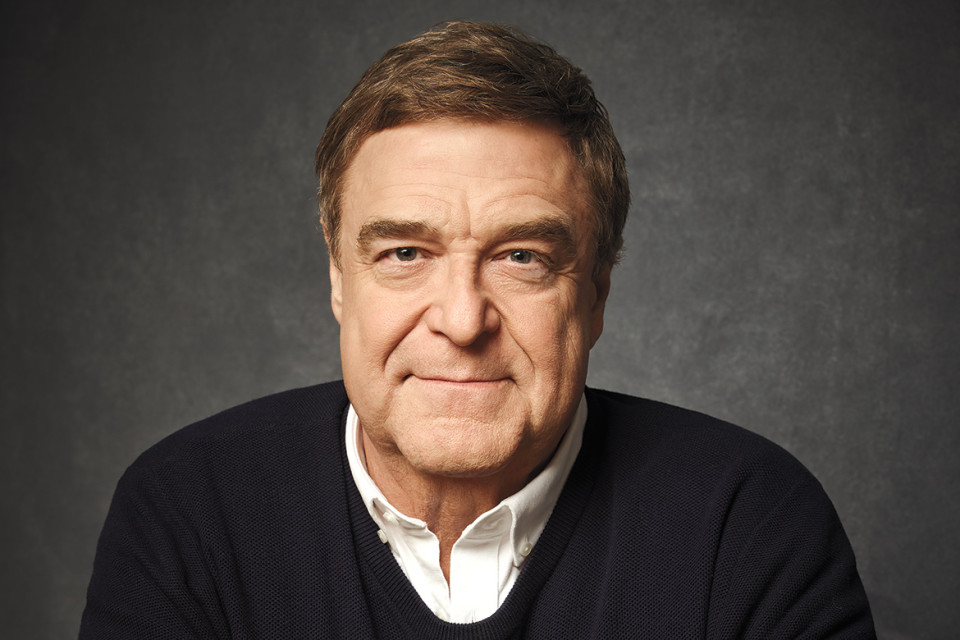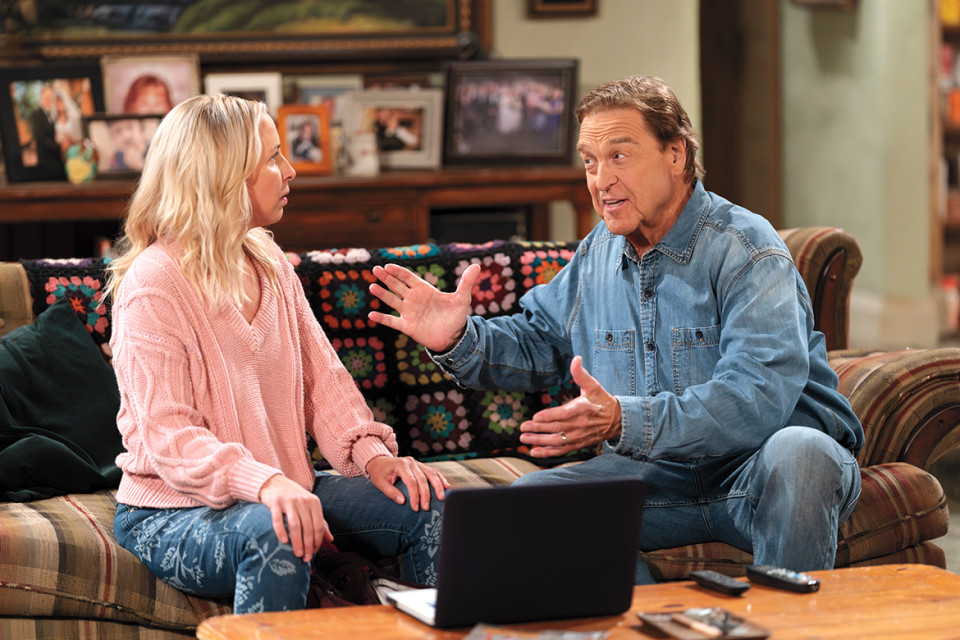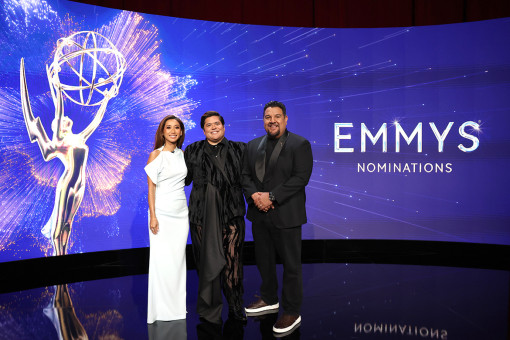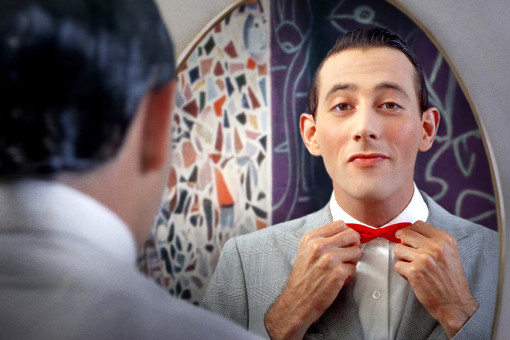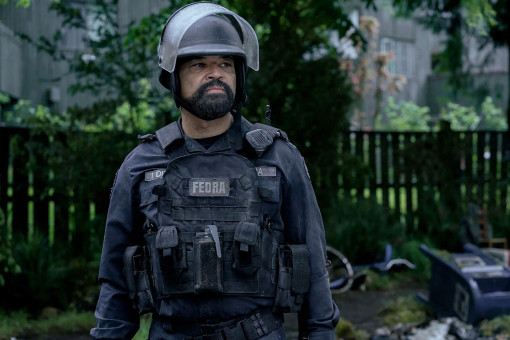John Goodman isn't one to overthink his calling in life. Though he’s speaking from London, in rehearsals for a Tom Cruise movie directed by Alejandro G. Iñárritu, his Midwestern self-effacement is very much present, and genuine. "An artistic gasbag" is the last thing he wants to sound like, he says. "It’s just not worth talking about my process."
Not that there isn’t a pinch of wisdom to absorb, however, when Goodman reveals an insight into himself: "The older I get, the more I learn, the more I forget and the happier I am," he says. "Whatever comes along, man."
For the past seven years, that “whatever” has kept the actor awfully busy, playing two very different father figures on television: megachurch patriarch Dr. Eli Gemstone on HBO’s The Righteous Gemstones and working-class dad Dan Conner on ABC’s The Conners, the Roseanne follow-up. With both series ending this year, he struggles with their absence, even as he marvels at the steady, joyful work experience he’s had with talented colleagues.
"It’s missing people," says Goodman, who’d been shuttling between South Carolina and Los Angeles from his New Orleans home to shoot both series. "It’s missing the family we make, the people I work with, hanging out with [Conners costar] Laurie Metcalf and laughing, watching everybody on Righteous Gemstones go nuts," he says with a laugh. "And they are nuts. If I’m watching Walton [Goggins, who plays Eli’s brother-in-law, Baby Billy], I have to bite the insides of my cheeks. He’s just brilliant. I’m a big fan of actors. I’m like a kid when there’s a good actor around."
Not surprisingly, Gemstones creator Danny McBride sounds like a kid himself recalling the nervous excitement of learning that a "comedic hero" of his was interested in playing dad to three flamboyant, unscrupulous heirs portrayed with raunchy abandon by himself, Edi Patterson and Adam Devine.
"I was like, ‘Do you think he even knows who we are?’" McBride says of his early discussions with the casting director, Sharon Bialy. "I couldn’t believe we were getting the chance to not only work with him, but get to know him — someone I’ve admired for so long. Honestly, he’s the ingredient that makes the show work. If everyone played it like Edi, Adam and I play it, there would be no legitimacy to this being a successful church. You need his gravity to buy this world."
Of course, over four seasons of Eli’s hand-wringing about leaving his televangelism empire to such irresponsible offspring, he hasn’t always been entirely upstanding either. Goodman got a kick out of playing a straight man who has gray areas around greed, despite an abiding decency. "Even though he was bent, somebody had to be moral," he says. "The bottom line was serving God and the flock, but if there was a way to make a couple more bucks out of it, they justified it — to the point where the kids turned out absolutely rotten. There’s a lot about Eli you have to overlook, especially [when it comes to] the kids. From Eli’s point of view, it’s a struggle trying not to hate them."
In the final season, however, Eli went from bereft widower to something like a lovestruck teenager while romancing his late wife’s best friend, Lori (Megan Mullally). "That was cool, because she was bad, but not all bad, and he’s the same deal," says Goodman, who thoroughly enjoyed the Eli-in-love storyline, and working opposite Mullally, who "can do it all. Such a pro — she’s smart, she’s funny."
It’s been a season of emotional renewal for Goodman’s character, made all the more invigorating in contrast to the longstanding grief that had made Eli a demanding, distant father. "He’d been lonely as hell. That boat has no rudder. The mother was the real moral force, and she’s probably the reason Eli had a religious conversion. He tried to honor that. But [church] expansion took him away from his family, until he just wanted to be alone."
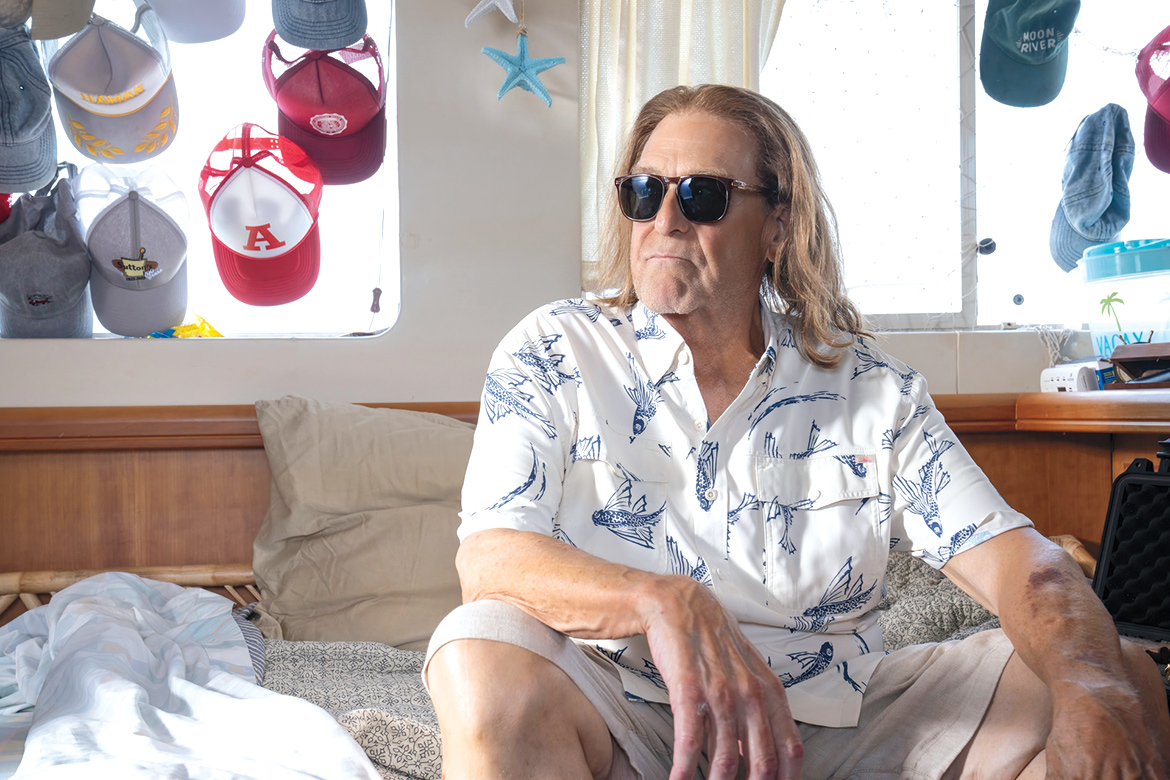 Goodman as Eli Gemstone on The Righteous Gemstones / Photo credit: HBO
Goodman as Eli Gemstone on The Righteous Gemstones / Photo credit: HBO
Goodman lost his own father at age 2, and his mother worked multiple jobs to make ends meet. He also knew something of fire-and-brimstone preachers from attending Southern Baptist services as a youth. Asked if his younger self would have been persuaded by an extravagant Gemstones show, he concedes, "I was a pretty emotional kid, and they play on emotions. We were a lower-middle-class congregation, and I just knew I was a bad kid. I remember one time, I grabbed my sister, who was two years younger, and marched her down to be saved. She was screaming and crying, and I was afraid for her soul. I was five or six. You don’t have the emotional equipment to deal with that kind of thing." Does his sister, Elisabeth, tease him about it now? He smiles. "I hope it’s a nice blank spot in her memory."
Surely a nicer childhood recollection is the two of them watching TV comedy pioneer Ernie Kovacs, a household favorite. "We’d just cry, we laughed so hard," Goodman recalls. "With TV, I’d pretty much watch anything — when it was working! Superman, Roy Rogers … wrestling was big with me. I was a sucker. I’d get up in the morning and watch test patterns, and the national anthem on the other end."
Goodman was a classroom attention-hog with football dreams but poor grades, so when he saw that a passion for the stage was helping his academics at Missouri State University, he made theater his major. "When I found something I was good at, it made me rethink the educational part, because I needed this information," he says. "Why did this happen? I need history. I need art. I need music. If I didn’t understand something, I’d go look it up."
He moved to New York to turn acting into a profession, and suddenly all his years as a school cut-up making fun of commercials stood him in good stead. "They were how I made my living for a few years," says Goodman, whose 1979 Skin Bracer ad (see it on YouTube) shows how his personality popped off the screen early on. His attitude about commercials, however, was a different matter.
"The more I did them, the more I hated them," he says. "I was hanging out with real A-list screen and stage actors, and I was doing commercials. I booked three, four a week, but I wasn’t desperate to do them. And yet the more I rejected them and didn’t care, the more they came in. It’s just ridiculous what I put myself through. I’ve learned my lesson. I got tired of beating myself up a long time ago."
In a short span of time in the 1980s, however, things fell into place. He conquered Broadway as part of the original cast of the Tony-winning musical Big River and got a foothold in movies with True Stories and The Big Easy. He made his most consequential film connection, though, when he auditioned for indie upstarts Joel and Ethan Coen for their sophomore film, the oddball 1987 crime comedy Raising Arizona.
"It was like goofing around for an hour," he recalls of that initial casting meeting, which begat a collaboration that would lead to unforgettable performances in the Coen Brothers’ Barton Fink, The Big Lebowski and Inside Llewyn Davis. "I’d always go to the set when I didn’t have to, just to have fun and see them make stuff up. I felt like I was on a roll with them, that I was in on the joke. Because they were provincials, as I was. They were from Minnesota, and I was from downriver, and we found a lot of the same things funny. It was a pleasure to hang with them, loitering in front of a camera."
He also fell in love in the late ’80s, meeting future wife Anna Beth during the filming of Everybody’s All-American in what became his future home, New Orleans. The last career puzzle piece fit into place when Goodman landed the sitcom part that would make him a household name. Sara Gilbert remembers not knowing who would play dad to her Darlene Conner when Roseanne’s first table read was held at a Howard Johnson’s in 1988. "We didn’t have internet, so you just had to wait and see who walked in the door," she recalls. "I thought, ‘Wow, this guy seems like someone who could actually have done drywall and painted.’ He had this real American working-class feel that you can’t fake — a kindness and also a gruffness. But then he’s this brilliant artist — just a unique combination."
Of those early Roseanne days, Goodman remembers the show’s outspoken star fighting to tell the stories she wanted to tell ("Roseanne could cut the fat off a script faster than anybody I ever met"); the laughs when George Clooney was on set; picking up fame-management pointers from friend and ABC colleague Bruce Willis (then starring on Moonlighting); and learning the ins and outs of four-camera sitcoms. "I was used to doing plays, so when I saw the live audience there, I started [playing to] them, which is stupid when you’ve got a tool right in front of you that’ll do that for you," Goodman says. "It took me a few episodes to calm down. I just didn’t want to coast. I was battling myself, per usual. But we were having some prime fun."
His eager participation in a reunion sketch in 2017 for Gilbert’s daytime show, The Talk, was instrumental in the Conner clan’s return to primetime. "It just felt so natural," Gilbert says of playing his TV daughter again after a 20-year absence. "I was so moved when we did it. I didn’t realize his emotional attachment. I didn’t think he’d ever want to do it. But John almost became the biggest fighter for it."
For Goodman, watching Gilbert go from 13-year-old costar to savvy executive producer was its own reward for returning to the part of Dan. "It was amazing, and I’ll be honest with you, I took pride in it," he says. "When she was a kid, she was goofy, cute, smart and funny, but she knows what she’s doing. I have all the respect in the world for her."
He’s seen another change over the years, too — in terms of what working-class people go through to get by. "When we started Roseanne, people could make a good living in labor, in construction," he says. "It’s just gotten harder. Wages didn’t keep up with the price of eggs. I was always a union guy, but you could see why guys wouldn’t want to pay the money for dues. You’re paycheck to paycheck. Labor is just disrespected. People are beholden to stockholders, and you can see it in the quality of a product and the service they’re giving customers. It doesn’t look like that balance is coming back. We could probably go on with The Conners until Dan dies of a stroke from overworking."
He’d love for that show to go on, too. After all, he began playing Dan Conner 37 years ago, a part that initially cemented his popularity. Even half a year out from filming the last episodes, his sadness about not being on set with his on-screen family from week to week is palpable. "It’s hard to just let whatever happens happen, instead of trying to jump on the next four-camera show, if I can get one," says Goodman, who enjoys watching classics like Cheers and Frasier. "I was still learning how to do it, basically. I don’t know how much longer four-cameras are going to be around. I want it back so bad, but it’s never going to be the same."
At 72 years old, he also grasps that a two-series-at-a-time workload has been a lot, and it might be time to take a breather after the Tom Cruise movie finishes. Goodman did get an unplanned break of sorts when he suffered a hip injury in the spring, although he recovered in good time. In fact, just before this interview he had a brisk walk to London’s Marylebone High Street, "the worst part of which was dodging people with my cane," he jokes. But watching Cruise has energized him. "It’s great to see his work ethic at this time in my life," he says. "It’s a nice shot in the arm — how seriously he takes it, and how much fun he has doing it. Forty years that guy’s been doing this."
Also, being back in London is lighting more sparks. Ten years ago, Goodman made his West End stage debut in a production of David Mamet’s American Buffalo. He calls it "one of my proudest moments," an experience he figures he’d have repeated more often were it not for being a sought-after actor across every medium. (Note: Goodman wouldn’t put it that way, though. Rather, he modestly says, "I never had the chance.")
He can still dream, though. "I’m in hog heaven over here," he says. "There are so many people I’d love to work with. It’ll happen. I’m getting up there, but I could sure handle eight shows a week. It’s different muscles. But they’re fun to exercise."
This article originally appeared in emmy Magazine, issue #8, 2025, under the title "American Dad."




